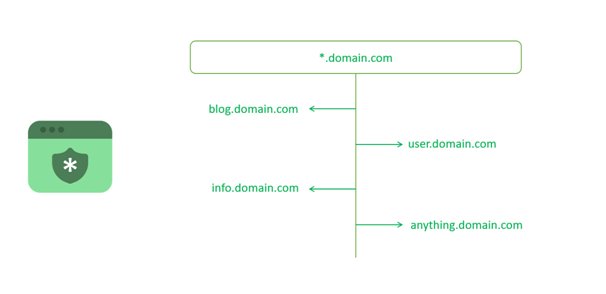In 2020, a report said that one million Secure Sockets Layer (SSL) certificates were being issued every day. This reflects the increasing preference of Internet users and search engines for websites that encrypt and protect the communication between a website and a visitor's browser.
Having an SSL certificate for your website is not merely an option. It has become one of the important components of protecting your site and ensuring all the confidential information during data transmission between the client, and central server stays encrypted and served through an HTTPS connection.
That being said, figuring out which SSL certificate to install on your website can be tricky, given that there are different types of certificates available at your convenience. If you have multiple subdomains, using a 'Wildcard' SSL certificate is the most obvious choice to make, as it secures all the subdomains with one single certificate. So, instead of buying one for each, you just have to buy one.
Let us explain what Wildcard SSL certificates are.
What are Wildcard SSL Certificates?
A Wildcard SSL certificate can be defined as an SSL certificate that has the power to secure your main domain along with all its subdomains. It means that instead of using individual SSL certificates for securing the associated subdomains, with one certificate, you can secure your primary domain and all the subdomains under that domain.
As the certificate offers to secure an unlimited number of subdomains with just a single certificate, it works with any subdomain of the base domain name it is made for. Let us give you an example:
The name of your domain is 'yourwebsite.com.' With a Wildcard SSL certificate, you can also protect 'subsite.yourwebsite.com' and 'subsite2.yourwebsite.com.' So, the certificate for your domain www.yourwebsite.com will also secure the following subdomains:
- yourwebsite.com
- news.yourwebsite.com
- blog.yourwebsite.com
- shop.yourwebsite.com
The domain name field of the wildcard SSL certificate is placed with a Wildcard character called asterisk (*) as a placeholder. It is responsible for securing multiple subdomains, the base domain, and the primary domain itself. For instance, with a Wildcard SSL certificate, you can secure your primary domain *.yourwebsite.com and accompanying subdomains like mail.yourwebsite.com, blog.yourwebsite.com, www.yourwebsite.com, and many more.
Some of the key features of this certificate are:
- No set limit on the number of subdomains to cover. All the primary domain's first-level subdomains are covered. Website owners can also add more subdomains during the certificate's validity period.
- Offers NIST and CAB Forum standard 256-bit data encryption.
- Exhibits compatibility with all modern web browsers and devices.
So, when can one get these certificates? Let us talk about that:
When can you Use a Wildcard SSL Certificate?
Some common scenarios where you can use a wildcard SSL certificate are:
- A web developer using subdomains for testing environments.
- A business using separate subdomains for various aspects and entities of the organization, such as blog, shop, etc.
- A user who needs a single top-level domain but plans to use multiple subdomains later.
Now the question is how the certificate operates. So, let us answer that for you:
How do the Wildcard SSL Certificates Secure all Subdomains?
Just like single-name SSL certificates, Wildcard certificates encrypt the data with the help of a set of keys. It consists of a public key stored on the digital certificate and a private key stored on your website's server. However, with a Wildcard cert, you can copy the private key and upload it to an unlimited number of servers to host the primary domain and all its subdomains.
After the installation of the certificate, all the traffic between your end user's browser and all the connecting web servers will be subjected to encryption. It means when a hacker makes an attempt to intercept data between a visitor's browser and your site's server, it will be unreadable to them. All they will see is a series of vague characters, which is an encrypted code. It is because only the server with the private key can decrypt the message.
One of the primary advantages of using Wildcard SSL is that there is a good scope of saving money and time. Moreover, it offers more flexibility to the users. Purchasing Wildcard SSL certificates if you own a single domain with numerous first-level subdomains (or are planning to add them in the future will help you secure all of them at once.
One of the best benefits of purchasing a Wildcard SSL certificate is to protect each chosen domain name subdomain without needing any extra setup or purchases when another subdomain is created.
Closing Thoughts
Almost all types of devices and web browsers, including desktop computers and mobiles, support Wildcard SSL certificates. Apart from this, the Wildcard SSL certificate comes with an unlimited re-issuance and an unlimited server license policy. It means you can re-issue it as often as possible and protect your site on as many servers as you deem necessary.
When you use a Wildcard SSL certificate, you can secure the data of your visitors on not just your primary domain but also on related subdomains. This will make sure you can keep your business running safe online while keeping your certificate management and expenses low.
While many reputable Certificate Authorities (CA) offer these certificates, they are expensive. That being said, there are various pocket-friendly options from where you can avail of cheap Wildcard SSL certificates. These certificates are structurally similar to other certificates, as they provide the same level of security but are designated by a CA policy identifier. It helps in featuring the company's domain name in the certificate. So get one for your site today!

0 comments:
Post a Comment